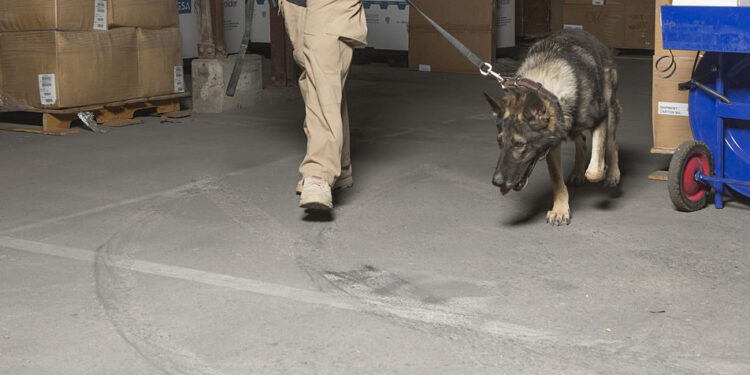Police dogs do more than protect and serve. They also function as brand ambassadors but a 2023 K9 photo contest designed to do just that backfired when participating law enforcement agencies started cheating to collect the $500 prize.
Blue Line Unlimited, the contest sponsor, had to cancel the vote and choose a winner at random. Instead of spreading goodwill, the friendly competition exposed an integrity problem.
“It is extremely unfortunate to see this happening, especially in a law enforcement setting,” Blue Line wrote in a statement.
Bad behavior when the stakes are low highlights the potential for bigger abuses when agencies turn their attention to a multibillion-dollar scheme called civil forfeiture. This law enforcement maneuver, which frequently involves drug-sniffing dogs, allows the government to seize and keep cash, cars and other valuables without a criminal conviction.
Many property owners permanently lose assets without being arrested or even accused of wrongdoing. Agencies can proceed on the flimsiest of excuses. All they need is a hunch that the property is somehow connected to criminal activity. Judges can push back and demand evidence. But many cases—more than 90 percent at the federal level—never make it that far.
Property owners facing civil forfeiture must pay for their own defense, and many give up or lose on technicalities without ever seeing a neutral decisionmaker. Once the process ends, participating agencies can keep up to 100 percent of the proceeds for themselves. Before any of this can happen, they must find the property they want to keep, which requires a search.
This is where police dogs come in.
The Constitution requires probable cause before officers can rummage through personal spaces like car trunks and cabs, and many courts accept an alert from a certified drug detection dog as sufficient to meet this standard.
K9s do not have to detect actual contraband. Often none exists. They can just follow their handler around a vehicle on a leash until the handler announces an alert has occurred. This does not need to be something obvious like a sudden change in K9 behavior. It can be whatever the handler says. Handlers can even use dog toys and hand signals during the process. And because dogs cannot talk, the handler’s testimony prevails in court.
Law enforcement agencies count on this. Some handlers jokingly refer to their K9s as “probable cause on four legs.” Others describe their K9s as a blank permission slip to snoop.
The ability of dogs to detect drugs is secondary.
What matters most when agencies patrol for profit is the integrity of the humans involved. Marine veteran Stephen Lara saw what can go wrong when a Nevada state trooper led a K9 around his vehicle during a 2021 traffic stop. Musician Phil Parhamovich had a similar experience while traveling through Wyoming in 2017. And volunteer Christian rock group manager Eh Wah faced his own ordeal while traveling through Oklahoma in 2016.
None of these men carried narcotics or anything illegal. But officers said their K9s smelled drugs, creating probable cause to search the vehicles. In all three cases, the agencies found cash and attempted to keep it through civil forfeiture. The property owners’ innocence did not matter. Our public interest law firm, the Institute for Justice, represented these men in separate cases, and they eventually got their cash back. Yet civil forfeiture made them vulnerable.
Civil forfeiture also makes drug detection dogs vulnerable. They become unwitting accomplices in the moneymaking scheme and can be abused, neglected and exploited as priorities shift from crimefighting to revenue generation. Tracking the harm can be difficult due to lax or nonexistent K9 reporting standards, but 2023 has produced many troubling cases.
An Indiana state trooper faced allegations of breaking his K9 partner’s leg using unreasonable discipline during a training session in March. A West Virginia officer was arrested after his K9 partner went missing in April. And a Utah Department of Corrections officer was placed on leave after his K9 partner died in a hot vehicle in July.
Meanwhile, officials will not say how K9 officer Kumo died in Rains County, Texas. His handler was fired for unspecified “policy violations” in May. Better K9 training, certification, and transparency could help reduce situations like these. But problems will persist as long as agencies can self-fund through aggressive enforcement. Ending civil forfeiture would eliminate the perverse incentive.
New Mexico already has taken this step, and a handful of other states are moving in the right direction. Additional reforms could come at the federal level with the Fifth Amendment Integrity Restoration (FAIR) Act, H.R. 1525, a bipartisan measure reintroduced in March 2023.
Crime should not pay. But agencies have other ways to seize and keep ill-gotten gains without trampling on constitutional guarantees of due process. One method already available is criminal forfeiture, which guarantees the right to counsel and requires a conviction. Additional safeguards, such as sending forfeiture proceeds to the General Fund rather than law enforcement bank accounts, can also ensure integrity. Property owners would be more secure without civil forfeiture. So would K9s.
Daryl James is a writer and Adam Linthicum is the civil forfeiture intake coordinator at the Institute for Justice in Arlington, Va.



























